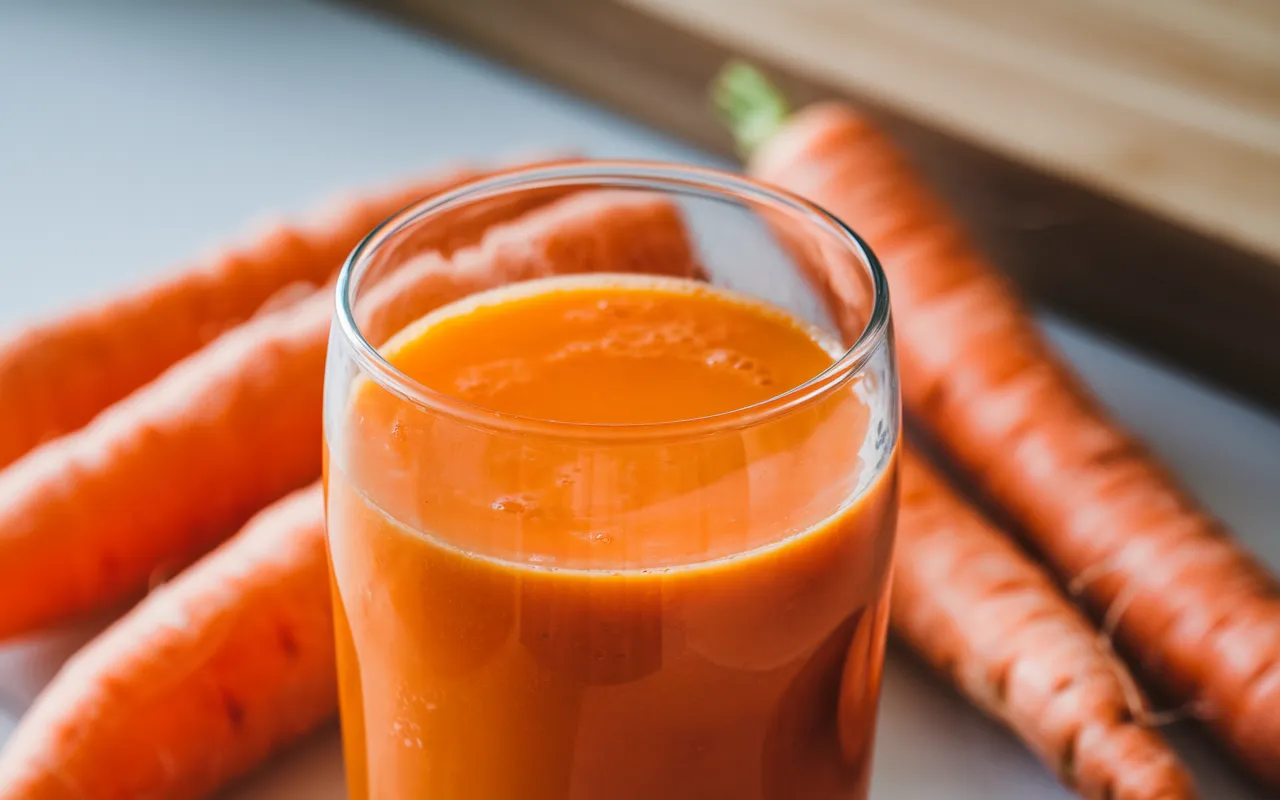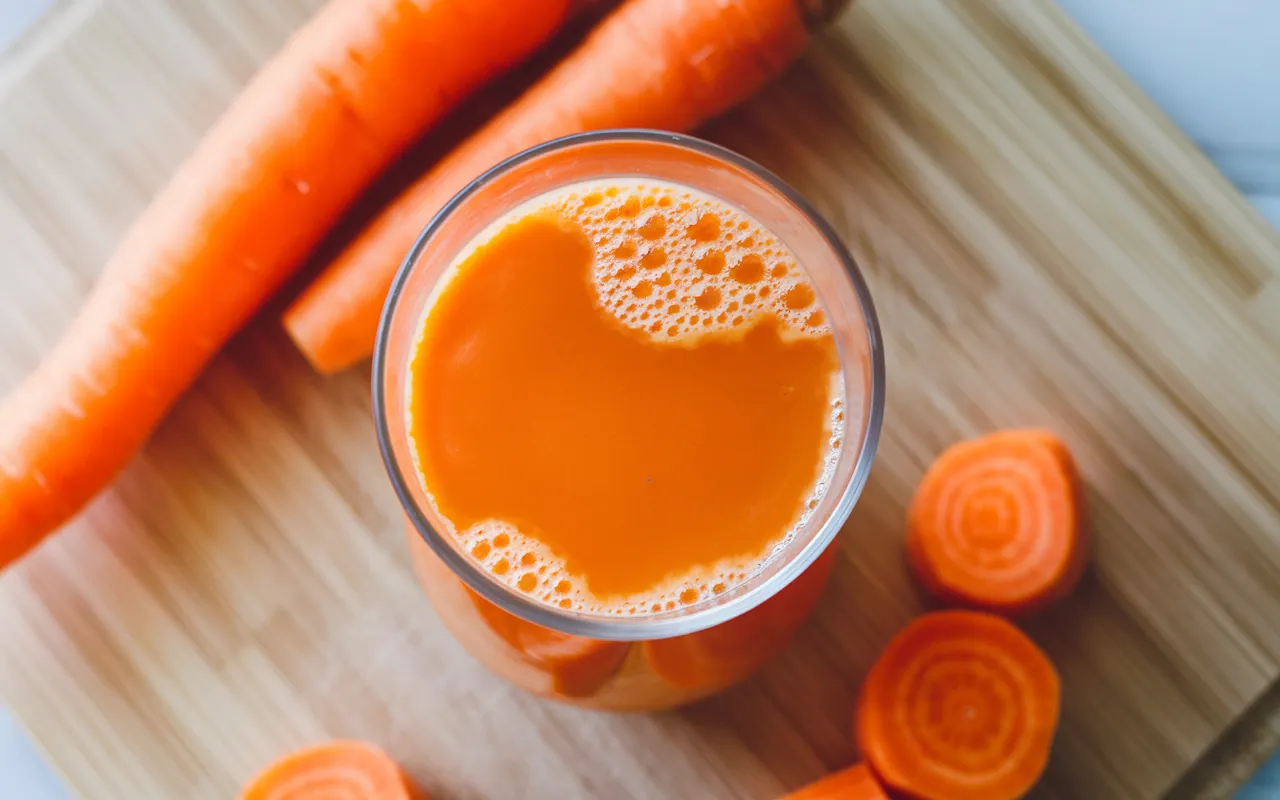This article explores how many carrots you need for a delicious glass of juice. We’ll look at carrot sizes and juice yield to help you get it just right.
Understanding Carrot Juice Yield
When considering how many carrots make a glass of juice, several factors come into play. The size of the carrots is a big one. Also, the type of juicer you use matters significantly. Not all juicers extract the same amount of juice. For example, a high-quality masticating juicer generally yields more juice than a centrifugal juicer.
Carrot Size and Juice Output
-
Small Carrots: Typically, 6 to 8 small carrots might be needed to get one glass of juice. These carrots are often about 5 to 6 inches long. They tend to be thinner, thus, yielding less juice per piece. Therefore, you will need more of them to fill a glass.
-
Medium Carrots: For medium carrots, about 4 to 5 are often sufficient for a glass. These are about 7 to 8 inches in length and a bit thicker.
-
Large Carrots: Large carrots, usually around 9 inches or longer, might only need 3 to 4 pieces. Because of their size, they hold more liquid. As a result, you’ll get more juice from a smaller amount of large carrots.
Types of Juicers Affect Carrot Juice Output
The type of juicer affects juice output quite a bit. Masticating juicers, sometimes called slow juicers, use a pressing action to extract juice. They tend to produce more juice with less pulp. In contrast, centrifugal juicers use a spinning blade to shred carrots. This method can be faster, but it often leaves behind more pulp and yields slightly less juice. Therefore, you need to consider the type of juicer you have when figuring out how many carrots make a glass of juice. Furthermore, the speed at which a centrifugal juicer operates introduces air, which might slightly affect the juice’s freshness. Therefore, the method of juice extraction makes a significant difference.
The Average Glass of Carrot Juice
Generally, an average glass of juice is about 8 ounces. Therefore, this is a helpful measure. To get 8 ounces of juice, you’ll need a certain number of carrots. The exact amount depends on the variables we’ve already discussed. However, here’s a rough guide for an 8-ounce glass of carrot juice:
-
Small Carrots: Around 6 to 8 carrots.
-
Medium Carrots: About 4 to 5 carrots.
-
Large Carrots: Roughly 3 to 4 carrots.
These are approximations, and individual carrot juice yield can vary. It’s always best to start with these amounts, and add or subtract as needed. Furthermore, the freshness of your carrots can also impact how much juice they produce, with fresher ones generally giving a higher yield.
How Many Carrots are Needed for Different Juice Volumes?
Understanding how many carrots to use isn’t just about a single glass. Sometimes you might want to make larger amounts. Here are some rough guidelines for different juice quantities.
For Two Glasses
If you want two 8-ounce glasses of carrot juice, you’ll need to double the amount of carrots. For example, if 4 medium carrots make one glass, you’ll need about 8 medium carrots for two glasses. In this case, using about 6 large carrots would likely be enough for a double serving. Moreover, when making juice for more than one person, calculating the volume needed beforehand is a good practice.
For A Larger Batch of Juice
Sometimes, making a bigger batch of carrot juice for the week is a good idea. For about 4 cups or 32 ounces of juice, you might need approximately 12 to 16 medium-sized carrots. However, this is an estimate. Always start with less and add more if needed to reach your desired amount. The better you get with experience, the more accurate you will become in estimating how many carrots make a glass of juice. Additionally, consider storing the juice properly to maintain its freshness if you are planning a large batch.
Considering Juice Combinations
Many people like to add other produce to their carrot juice. Doing so, changes how many carrots you’ll use. For example, adding apples or ginger will change the amount of juice each ingredient contributes. Thus, you will not need as many carrots. Likewise, the addition of water to dilute the juice can affect the overall amount and the number of carrots needed. Therefore, you need to adapt your recipe based on your desired taste and consistency.
Adjusting for Personal Preferences
Everyone’s juice preferences are a bit different. Some may like it thicker, while others prefer it more diluted. Accordingly, the number of carrots you use may change. Always adjust based on your personal taste and the desired consistency. If you prefer a sweeter juice, using more carrots may be a better choice for you, which will influence how many carrots make a glass of juice for your needs.
Tips for Juicing Carrots
Getting the most juice out of your carrots is easy. Here are some tips to help:
Choose Fresh and Firm Carrots
Firstly, the quality of the carrots matters. Fresh, firm carrots will yield more juice than limp ones. Therefore, always select carrots that feel heavy for their size. Also, make sure they are bright orange. Furthermore, avoid carrots with visible cracks or blemishes, as these can affect juice quality.
Wash Carrots Well Before Juicing
Always wash your carrots thoroughly before juicing. This removes any dirt and makes sure your juice is clean. Scrubbing with a vegetable brush is best. Additionally, cutting off the ends helps remove any bitterness. Indeed, thorough cleaning prevents any unwanted flavors from ending up in your juice.
Consider the Thickness of Carrot Slices
For some juicers, slicing carrots into smaller pieces helps. If using a masticating juicer, cut carrots lengthwise. Then, you may get more juice. If you’re using a centrifugal juicer, smaller pieces will prevent the blade from clogging. Therefore, the thickness of carrots matters when you are considering how many carrots make a glass of juice. Additionally, uniformly cut carrots make the juicing process more efficient.
Juicing with or without Peeling
Whether or not to peel carrots before juicing is another common query. While the peel contains some nutrients, it can also have a slightly bitter taste. If using organic carrots, washing well might suffice. However, if you prefer a milder juice or are not sure of the carrot’s origin, peeling may be the better option. This decision slightly impacts the number of carrots needed, as some volume is lost when peeling.
Adding Other Vegetables and Fruits
-
Experiment with different flavors. Try adding ginger, lemon, or apples. These additions can enhance the taste and nutrients of your carrot juice. Moreover, this will also change the number of carrots needed for your recipe.
-
Beets are another popular choice for juicing alongside carrots. Their earthy flavor and extra nutrients make them a good addition. However, they may also alter the overall color and taste of your juice.
-
Celery is a great low-calorie vegetable that compliments carrot juice. You might find that it dilutes the juice slightly, thus requiring more carrots.
Storing Your Carrot Juice
Freshly made carrot juice is best consumed right away. However, if you need to store it, use an airtight container. Then, keep it in the refrigerator. It can generally keep for about 24 to 48 hours. Furthermore, the longer it sits, the more nutrients it may lose. Therefore, try to consume it as soon as possible. Also, remember to shake the juice before consuming, as the juice might separate while stored.
Benefits of Carrot Juice
In addition to knowing how many carrots you need, it’s also good to know why drinking carrot juice can be beneficial.
Rich Source of Nutrients
Carrot juice is rich in nutrients. It’s a good source of beta-carotene. Beta-carotene turns into A vitamins. Carrot juice also provides K vitamins, C vitamins, and potassium. These help your body in many ways. Specifically, these vitamins are vital for maintaining good health.
Antioxidants and Their Effects
Carrot juice is packed with antioxidants. These antioxidants help protect your body from harmful molecules. They can also help with your immune system. Antioxidants are important to maintaining good health. Indeed, a diet rich in antioxidants can reduce the risk of chronic diseases.
Digestive Benefits
Some people find that carrot juice aids in digestion. The natural compounds in carrots may support a healthy gut. Furthermore, the juice is easily absorbed into your body. Therefore, this makes the nutrients more accessible. Consequently, this can be helpful for people who have sensitive stomachs.
Skin Health
-
The beta-carotene in carrot juice can contribute to skin health. Some believe that it can enhance skin tone and provide protection from sun damage. However, more studies are needed to confirm these benefits.
-
The antioxidants also play a part in protecting skin cells from damage. Therefore, regular consumption may contribute to a healthy skin complexion.
Eye Health
-
The A vitamins from carrot juice are well-known for supporting eye health. A vitamins is essential for vision. Accordingly, consuming carrot juice regularly may improve vision and support healthy eyes.
-
These vitamins can also reduce the risk of developing age-related eye problems.
Immune System Support
The vitamins in carrot juice, like C vitamins, help support the immune system. Therefore, it can help your body fight off infections and diseases. Consequently, this makes it a good choice for strengthening your overall health.
Potential Anti-Inflammatory Effects
Some studies suggest that the nutrients in carrots can have anti-inflammatory properties. However, more research is still needed to fully understand this effect. If you’re wondering how many carrots make a glass of juice and also offer these benefits, it’s great to know that carrots do offer more than just one.
Maintaining Weight
-
Carrot juice is low in calories, which can be helpful for maintaining a healthy weight. Therefore, it makes for a great refreshing beverage that’s also satisfying.
-
It can also make you feel full due to its high nutrient content. As a result, you may feel less hungry and consume fewer calories during the day.
A Flexible Addition to Your Diet
-
Carrot juice is a flexible beverage that can fit in most diets. It can also be a great addition for people who have trouble eating whole vegetables.
-
Its natural sweetness also helps people consume more vegetables without feeling restricted.
Frequently Asked Questions
Let’s look at some common questions about how many carrots make a glass of juice.
How many carrots for a glass of juice?
-
The number of carrots needed for a glass of juice varies. Small carrots might require 6 to 8. Medium carrots often need 4 to 5. Large carrots generally need only 3 or 4. Therefore, size matters when you ask, how many carrots do I need?
How many carrots for 8 ounces of juice?
-
For an 8-ounce glass of juice, use roughly the amounts given above. About 6 to 8 small carrots, 4 to 5 medium carrots, or 3 to 4 large carrots should work. However, these are just approximations.
Is drinking carrot juice the same as eating carrots?
-
No, drinking carrot juice is not exactly the same as eating whole carrots. Juicing separates the fiber from the juice. Whole carrots provide fiber, which is good for digestion. Juice, however, provides a concentrated dose of nutrients. Therefore, both have benefits.
Do carrots produce a lot of juice?
-
Yes, carrots produce a good amount of juice. The amount will depend on their size and juicer type. Masticating juicers tend to extract more juice than centrifugal juicers. Therefore, choose a good juicer to maximize output.
Conclusion: Finding the Right Carrot Count
In conclusion, finding out how many carrots make a glass of juice depends on various factors. Carrot size and your juicer are both key. While general guidelines exist, experimentation is helpful. Start with the recommended amounts and adjust to your preferences. Enjoy experimenting with different carrots and juice combinations. Finally, remember that carrot juice is rich in nutrients and can be a refreshing addition to your diet. Additionally, understanding these nuances will improve your juicing experience.


